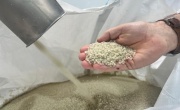England recycled 40.4 per cent in the first few months of 2014
New figures released today (18 November) show that local authorities (LAs) in England recycled 40.4 per cent of household waste in the first three months of 2014, up 1.7 per cent from the same period the year before.
According to the figures from the Department for Environment, Food & Rural Affairs (Defra), of the 5.1 million tonnes of household waste collected between January and March 2014, 2.07 million tonnes were sent for recycling, with more than 70 per cent (1.5 million tonnes) consisting of dry recyclables.

Indeed, dry recyclables equated to 32.5 per cent of all household waste collected, up just 0.1 per cent on the same quarter last year. The overall recycling rate for the quarter was pulled up by an increase in organics recycling, which rose by 157,000 tonnes year-on-year (from 444,000 tonnes in the first three months of 2013, of which 66,000 tonnes of which was separately collected food waste).
Notably, the quarterly figures show that January-March 2014 was the first time LAs in England sent less than half of waste from households for disposal in a quarter. Just over 47 per cent of all household waste was sent for disposal (of which 66 per cent was sent to landfill and 34 for incineration), down from 48.5 per cent in 2013.
Annual figures
For the 12 months ending March 2014 (the financial year 2013/14), the household waste recycling rate was 44.5 per cent, up from 43.9 per cent, and was ‘particularly influenced by organic recycling returning to more typical levels in January to March 2014 against a relatively low level in January to March 2013’.
Like other parts of the UK, local authority managed waste going for incineration with energy recovery increased significantly, rising by 13 per cent to 6.2 million tonnes in the financial years 2013/14 on 2012/13.
Local authority performance in 2013/14
Of all English LAs, South Oxfordshire District Council had the highest household recycling rate at 66 per cent, with over 55 per cent of their recycling comprising of green/organic waste.
Commenting on behalf of the council, Councillor David Dodds, Cabinet Member for Waste, said: "We are very proud that South Oxfordshire is the number one area in the country for recycling. The service we provide is designed to make recycling easy, and our residents have responded by ensuring they recycle as much rubbish as possible, and by limiting the amount of other waste produced. They are the ones who are setting the standard for others to follow and deserve our congratulations."
Rochford District Council and Vale of White Horse District Council both achieved rates of 65 per cent.
Ashford Borough Council achieved the most significant increase in its rates, rising from 12 to 42 per cent from 2012/13 to 2013/14, following the introduction of new recycling arrangements, which include organic waste recycling collections.
Newham London Borough Council and Lewisham London Borough Council had the lowest household recycling rates, at 18 per cent in 2013/14.
However, it should be noted that direct comparison between LAs is marred by the fact that some LAs did not report how much of their recycling was rejected at recycling facilities, while others did.
Confirmation that England recycled 44.2 per cent in 2013
The statistics also confirm that the recycling rate for the calendar year 2013 was 44.2 per cent, only marginally up from 44.1 per cent in 2012 (as reported by Resource in August).
This strengthens the worrying trend in plateauing recycling rates in England. Indeed, the stagnation in recycling rates led Defra to warn last year that if increases remain low, England’s recycling level will be ‘insufficient’ to meet the EU’s target of recycling 50 per cent of household waste by 2020. (Despite these warnings, Defra ‘stepped back’ from some of its waste policy work in April 2014, due to budget cuts.)
Government should ‘do more’ to boost rates
The results have triggered many in the waste industry to bolster calls for the government to take more action to increase recycling.
Chief Executive Officer of waste management firm SITA UK, David Palmer-Jones, said: “With dwindling recycling rates and less than six years to go, the risk of the UK missing its EU target of a 50 per cent household recycling rate by 2020 is increasing.
“Despite a small annual increase in England’s recycling rate, on the calendar year basis to end 2013 that Defra has used to present the statistics, the pace of improvement is still far off that required to place the UK back on a greener path to resource security.
“Active leadership and a policy sea-change is needed at national government level to put the country’s recycling performance back on an upward trend.”
He noted that the slight increase in annual recycling rates was largely a result of “greater public participation in some key, heavily populated, urban local authorities, which have made significant improvements from a very low base by seizing the political initiative”.
SITA has now updated its local authority recycling map to reflect the new figures.
The Environmental Services Association’s Economist, Jacob Hayler, added that “far from stepping back from waste-related issues, Defra needs to be making fresh interventions to help local authorities and their private sector partners introduce the services needed to reach the 50 per cent target for 2020”.
Dan Cooke, Director of External Affairs at Viridor, went further, stating that there needs to be a "firm focus on ‘front end’ recycling and how to get to near term and more stretching targets – re-telling the story of why recycling matters and why quality, not just quantity, counts".
He added: "We need to invest in education, engagement and convenient collection systems and, most importantly, in more ‘next generation’ infrastructure. This will combine accessible, simple recycling with quality focused outputs through smart use of technology...To help us do that, we need government to step forward, not backwards, in providing clearer support in incentivising best practice whilst tackling waste crime. Only then will we significantly improve rates of recycling in England and truly maximise the potential of a national renewable resource.”
However, Kristian Dales, Sales and Marketing Director at waste management company FCC Environment, noted that the waste management and recycling industry has a “vital role to play in helping local authorities deliver a user-friendly system of collections which is cost-effective and will continue to boost recycling levels”.
He added: “In order to provide long-term support to prevent the stagnation of recycling rates, our industry needs consistency regarding legislative and economic drivers to encourage investment in infrastructure and market growth.”
Read the full recycling figures for local authority collected waste from households.




